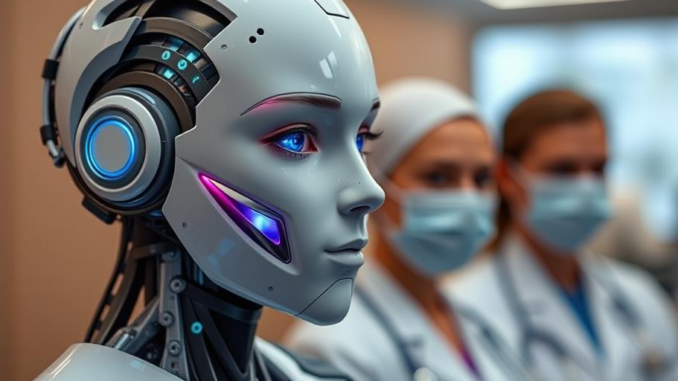
Summary
Artificial intelligence promises to revolutionize healthcare, offering solutions for everything from diagnostics to drug discovery. However, widespread adoption faces hurdles, including ethical concerns, data privacy, and the need for rigorous clinical trials. This article delves into AI’s potential and the challenges it must overcome to truly transform healthcare.
Main Story
AI’s changing everything, isn’t it? And honestly, healthcare might just be where it has the biggest potential impact. We’re talking earlier diagnoses, way more personalized treatments – AI could seriously shake up how we do medicine. But, you know, the big question is: can it actually live up to all the hype? What hurdles do we need to clear to make sure it’s used responsibly and, well, actually works?
Think about diagnostics. AI’s already showing it can analyze medical images like X-rays and MRIs with crazy speed and accuracy. I mean, sometimes it spots things that even the most experienced doctors might miss. That’s a game-changer. Faster diagnoses mean faster treatment, better outcomes, especially in places where specialists are scarce. Plus, it’s not just about spotting problems; AI can speed up drug discovery, predict how well different treatments will work, and even flag potential side effects. It’s kind of mind-blowing, really. For example, a friend of mine, a radiologist, was initially skeptical. Now? He swears by the AI tools he uses to double-check his readings, says it’s caught a few things he’d have otherwise missed in his long shifts.
And it’s not just about finding and fixing; AI’s changing how care is delivered. Telemedicine platforms are using AI to connect patients with doctors remotely. Virtual consultations, monitoring vital signs, personalized health advice – it’s all becoming more accessible, especially for people in rural areas or those who just can’t easily get to a doctor’s office. It also makes things more efficient; less paperwork, automated data entry, streamlined hospital workflows, freeing up doctors and nurses to, you know, actually focus on patients.
However, it isn’t all sunshine and roses. There are real challenges to overcome before AI becomes the norm in healthcare. Data privacy is huge, right? We’re talking about incredibly sensitive personal information. We have to have rock-solid safeguards in place to protect that data from getting leaked or misused. On top of that, AI algorithms need tons of data to train and validate, and if that data’s biased, the results will be too. So, careful data curation and validation? Absolutely crucial.
Then there’s the whole ethical side of things. How much autonomy should we give AI systems when it comes to making medical decisions? Will it replace human healthcare professionals? I don’t think it will replace them, but the role will need to change. Transparency is key; patients and doctors need to understand how these algorithms are making decisions. That said, the cost of implementing and maintaining these systems can be a barrier, potentially creating disparities in access. It would be a shame if only the wealthy could benefit from these advancements.
We also need rigorous clinical trials to prove these AI-powered tools are safe and effective, before rushing to implement them everywhere. And regulatory frameworks? They need to keep up with the incredibly fast pace of AI development, ensuring these technologies meet stringent standards before they’re used in clinical settings. The collaboration between researchers, clinicians, policymakers, and technology developers is extremely important, as is taking the time to develop appropriate guidelines and regulations.
The future? Promising, definitely, but also a bit uncertain. AI has the potential to revolutionize healthcare. To make it a reality, we’ve got to address the ethical implications, the data privacy concerns, and the need for solid clinical validation. As AI continues to evolve, we’re going to need an ongoing conversation and collaboration among everyone involved to harness its power responsibly and fairly. And that’s, I think, the most important thing of all, ensuring these benefits are available to everyone who needs them.


Be the first to comment